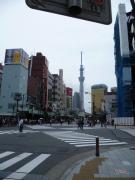- 2011-08-31 (Wed) 22:58
- Random thoughts
Now I’ve just arrived at Washington DC. It was a very good stay in Chicago, partly due to the hospitality of Larry, Judy and her father Tom. (I’ve met Larry in Hannibal. The good luck is still continuing.) Certainly I’ve enjoyed the vigor of the third largest city in this country. Those skyscrapers in the city were something worthy of seeing. How many times I had to look up to see the top of the buildings. As a short man of 5 feet 4, it had been a tough week.

The view from the top of the Willis Tower was also memorable. We are now in the middle of building the world tallest skyscraper in downtown Tokyo, called “Tokyo Sukai-tsurii” (Sky Tree). When completed in May next year, it would be 634 meters high, 222 meter higher than the Willis Tower. When you think that we are expecting another “Big one” any time in the foreseeable future in and around Tokyo after the Great earthquake and tsunami in March this year, which had hit the northern and central part of Japan, this tower is all the more significant.
In Chicago, I wanted to visit a place related to an American writer, Theodore Dreiser (1871-1945). Unfortunately I couldn’t find any such place. He is the author of such novels as “An American Tragedy” and “Sister Carrie.” As he lived and worked briefly during his life, I hoped that I might come across something related to him or his work.
“An American Tragedy” is a story of a poor young man, named Clyde Griffiths who struggle to climb up a social ladder, relying on a connection of his father’s rich brother. When he finally reached the very entrance of the rich world, with a beautiful girl with a rich family, he finds his girlfriend whom he picked up to satisfy his young sexual needs at his work place pregnant with his baby. If this fact were revealed, it is all over for his dream. Clyde eventually goes to the scaffold with the crime of the alleged murder of the girl.
The novel was published in 1925. It was a time, I suppose, America was in full swing to the capitalist society, with millionaires’ life glittering from magazines and posters along the streets, enticing the poor youngsters like Clyde with envy and longing. I just wonder how the situation is different now from those days in early 1900’s. Judging from the talk I’ve had so far since my arrival at the US late June, it seems to be the same or worse.
Lots of young people, I hear, find it difficult to get a job nowadays. After graduation some of the university students just go home to live with their parents to make ends meet. It is nothing unusual in Japan to see young adults to continue living with their parents, though. Graduating from universities or starting to work did not mean leaving their homes right away in our country. But it would be, I suppose, quite an unusual sight here in US.
The Chicago Tribune recently cited a finding that the disparity between the CEOs of a company and average workers are increasing: 42 to 1 over 30 years ago to more than 300 to 1 now. Staggering figures. With all the economic ailments in Japan, I don’t think that the disparity in the same categories is more than 10 or 15 in our country.
When walking on a street one day in downtown Chicago, I came across a man selling magazines. I thought it must be something like “Big Issue,” which has originated in Britain but now spread to other countries including Japan, with an aim of self-help of the unemployed people. I stopped to buy it so that I can contribute the vender’s profit in the sales. Actually it was not at all like the “Big Issue” type magazine. It was just a leaflet of movie notices. I wished to leave at once. But I had already started up a chat. It would be, I felt, a bit rude to do so. I asked him how much he expects from a passerby buying the leaflet. “Oh, it depends on the person. Just leave anything you feel like.” When I dipped my hand into a pocket, a five dollar bill came up. He saw it. I knew it. OK, Goodbye my precious 5 dollar bill!
When I was about to leave the man, he thanked me, with something like “You are very kind-hearted. Thank you, young man.” I froze with the compliment. I returned to the man and said. “Listen, how old do you think I am? Maybe I’m older than you. I’m 57.” He replied to me smiling, “Oh, you don’t look that old. I’m getting at 50 years old soon. But you are a fine young looking man.”
I know I look young as long as I have a cap on my head. I feel young and act young. Somehow I feel that there would be lot more years to go in my life. Maybe from now I should call myself “Dorian Gray” from Japan, although I don’t carry with me a picture, which absorbs age for me.
(Photo: “Tokyo Sky Tree” in Tokyo’s Asakusa area, as of early June this year. The tower is about in the middle, although it looks very tiny.)
- Newer: Thank you, Mr Poe.
- Older: Mark Twain experience







